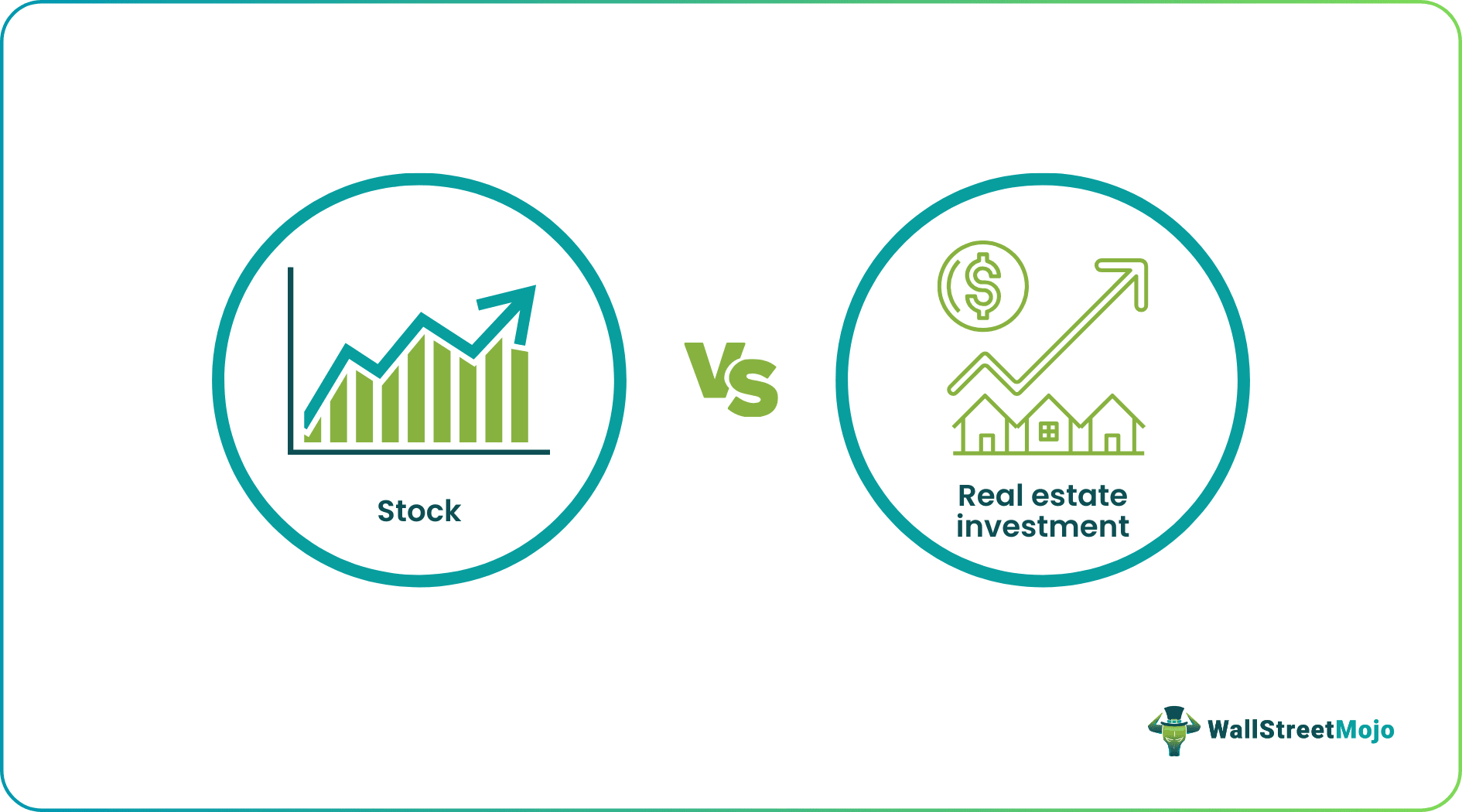Table Of Contents
Difference Between Real Estate and Stock Investment
Real Estate investment refers to investing in a property or tangible and real assets, which are often for the long term which is a lengthy process and illiquid, whereas Stock investment refers to investing money in a company by purchasing its share of stock and earning profit by selling the shares at a good price which is easy, quick and liquid.

Stock refers to a share in the company's ownership, which represents a claim on the assets and earnings of the company.
Real estate refers to land and buildings, including the natural resources and associated components such as water and minerals. It can further include residential, industrial, and commercial real estate.
Stock vs Real Estate Investment Infographics
Let’s see the top differences between stock vs real estate investment.

Key Differences
- A stock represents a share in a company's earnings, whereas real estate is a property over a piece of land that has been purchased for either personal use or further monetary gains.
- Stock does not cost much and depends on the investment objective of the buyer. The prices of stocks are volatile, and the fundamentals and financial performance of a company also directly impact the stock price. Real estate is normally a one-time investment and depends on the buyer's investment ability, the size of the real property, location, ROE from the property, etc.
- A stock is generally a short-term objective depending on the portfolio requirement. However, real estate is a very long-term objective and can spread over the decades.
- Stocks are highly liquid and can be sold relatively easily, but real estate is comparatively less liquid. It can require a lot of time since multiple factors are involved, such as legal hurdles, reasonable prices, etc.
- Stocks will generate dividends depending on the company's financial performance, which may or may not be regular. Real estate does not generate dividends, but if the real estate is leased out, it shall generate a sufficient amount of rent on a periodical basis.
- A bank loan facility is generally not available for the stock transaction, but the purchase of real estate generally requires the aid of a bank loan.
- The variations in the price of real estate define the economy's condition. The price of a stock can change at every millisecond, and every penny can make a difference since these can be purchased in bulk. However, prices of real estate change on a gradual basis and are directly influenced by various macroeconomic factors. If prices are rising gradually, it indicates an advanced economy and vice-versa.
- A stock makes the holder an owner in terms of voting rights on various matters but cannot take decisions involving senior management. However, owners of real estate are responsible for all decisions that directly impact the existence of the property.
- The company can buy stocks back if the need arises; however, real estate cannot be brought back once sold.
Stock vs Real Estate Comparative Table
| Basis of Comparison | Stock | Real Estate |
|---|---|---|
| Meaning | Share in the earnings of a company. | Property on a piece of land is utilized for further expansion. |
| Ownership | Stockholders are owners on paper but technically cannot own the company. | One can be the complete owner of the property. |
| Liquidity | Highly liquid. | Less liquid in comparison and can take time depending on a case-to-case basis. |
| Maintenance | No maintenance charges have to be paid. | Regular maintenance has to be executed to ensure the property is in good condition. |
| Risk Level | Generally volatile. | Relatively stable. |
Note
One should assess that the performance of the overall stock market and the real estate market indicates how the country is economically performing. If the stock market is rising, it is an indication that all the sectors are performing well and hence overall performance is improving.
On the other hand, the general price rise of real estate needs to be assessed. Generally, it indicates growing prosperity, but factors such as real estate providers need to be studied. The real estate provider must have spent a very heavy amount constructing/purchasing the property and stocks, and real estate may want to clear their debts. The base of the 2008 Global Financial crisis was due to inflating real estate prices, and ultimately non-payment of dues led to the crash.
Final Thoughts
Both Real Estate and Stocks are used as an investment avenue by investors. Though one can use real estate as a twin objective for personal residence and by allowing the value of the real estate to increase, stocks are generally used for parking excess income and allowing it to grow depending on the objectives and risk appetite of the investors.
Hence, stock or real estate will continue to exist, but the selection and quantity will depend on the investor/pool of investors.
